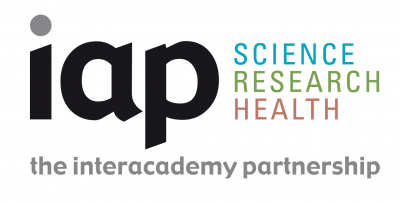The InterAcademy Partnership – the global network of national science, medical and engineering academies – yesterday launched a new three-year project on scientific advice for global policymaking. Conducted in partnership with the Institute for Advanced Study (IAS) with support from Carnegie Corporation of New York , the project will explore how to strengthen scientific input to the United Nations, governments, and other stakeholders aimed at achieving the UN’s Sustainable Development Goals (SDGs). Officially known as Transforming Our World: the 2030 Agenda for Sustainable Development, the SDGs are 169 aspirational targets for sustainable human development, covering issues such as ending poverty and hunger, ensuring healthy lives and quality education, combating climate change, and protecting the global environment.
At its inaugural meeting in New York today, the project's committee of 11 scientists, experienced in multilateral cooperation in science and science policy, discussed the current landscape for global scientific advice and explored ways of strengthening the science-policy interface. Several invited experts provided insights on the key challenges that scientists and science advisers face in global systems.
Over the course of the project, the committee will explore the strengths, weaknesses and opportunities for science advice; where national science academies and inter-academy networks can play their part; and what needs to change for better regional and national evidence-based implementation of the UN's global policy frameworks.
“The UN’s 2030 Agenda is a well-articulated, globally adopted framework. It is high-impact, high-stakes, and provides an opportunity to examine the increasingly complex landscape of global science advice,” said Professor Robbert Dijkgraaf, President of IAP and Director and Leon Levy Professor at IAS. “I anticipate that this project will provide useful insight to the academies and the wider scientific and policymaking communities.”
Professor LI Jinghai, co-chair of the IAP project committee and vice-president of the Chinese Academy of Sciences, reiterated the importance of providing high-quality evidence-based advice to policymakers: “IAP and other international science networks – including ICSU (the International Council for Science) – can help ensure that science plays its part in attaining the Sustainable Development Goals (SDGs). They can help shape policies and best practices for developing policy advice as a foundation for improving practices worldwide.”
“This project can help foster dialogue and cooperation between providers of global scientific advice,” added Dr. Eva Alisic, IAP project committee co-chair and past co-chair of the Global Young Academy, “including all disciplines, and all generations. Both established and early-career scholars are keen to make science work for society.”
More about the IAP
The InterAcademy Partnership (IAP) is a new umbrella organization formed by the merging of three established inter-academy networks: the InterAcademy Council, IAP—The Global Network of Science Academies, and the InterAcademy Medical Panel. IAP currently has 136 member academies, which together reach governments that represent 95 percent of the world’s population.
InterAcademy Partnership
Committee on Improving Scientific Input to Global Policymaking: Strategies for Attaining the Sustainable Development Goals
Dr. Eva Alisic (co-chair)
Immediate past co-chair, Global Young Academy
Senior research fellow, Monash University, Australia
Visiting scholar, University Children's Hospital Zurich, Switzerland
Visiting scholar, University Medical Center Utrecht, the Netherlands
Professor LI Jinghai (co-chair)
Vice President
Chinese Academy of Sciences
China
Emeritus Professor Michael Barber
Chair, Securing Australia’s Future program, Australian Council of Learned Academies
Fellow, Australian Academy of Science
Australia
Professor Rajae El Aouad
Immunology and Health Policy and Management
Hassan II Academy of Science and Technology
Morocco
Professor Peter Fritz
Scientific Director (retired)
Helmholtz Centre for Environmental Research UFZ
Germany
Professor Sandy Harrison
Centre for Past Climate Change
Geography and Environmental Science
University of Reading
United Kingdom
Professor Norichika Kanie
Graduate School of Media and Governance, Keio University
Senior Research Fellow
The United Nations University Institute for the Advanced Study of Sustainability (UNU-IAS)
Japan
Professor Keto Elitabu Mshigeni
Research Professor
Hubert Kairuki Memorial University (HKMU)
Tanzania
Professor Muhammad Saidam
Chief Science Officer
Applied Science
Royal Scientific Society
Jordan
Professor Francisco José Sánchez-Sesma
Institute of Engineering and Graduate Earth Sciences Program
National Autonomous University of Mexico (UNAM)
Mexico
Professor Robert Scholes
Global Change and Sustainability Research Institute (GCRSI)
University of Witwatersrand
South Africa

